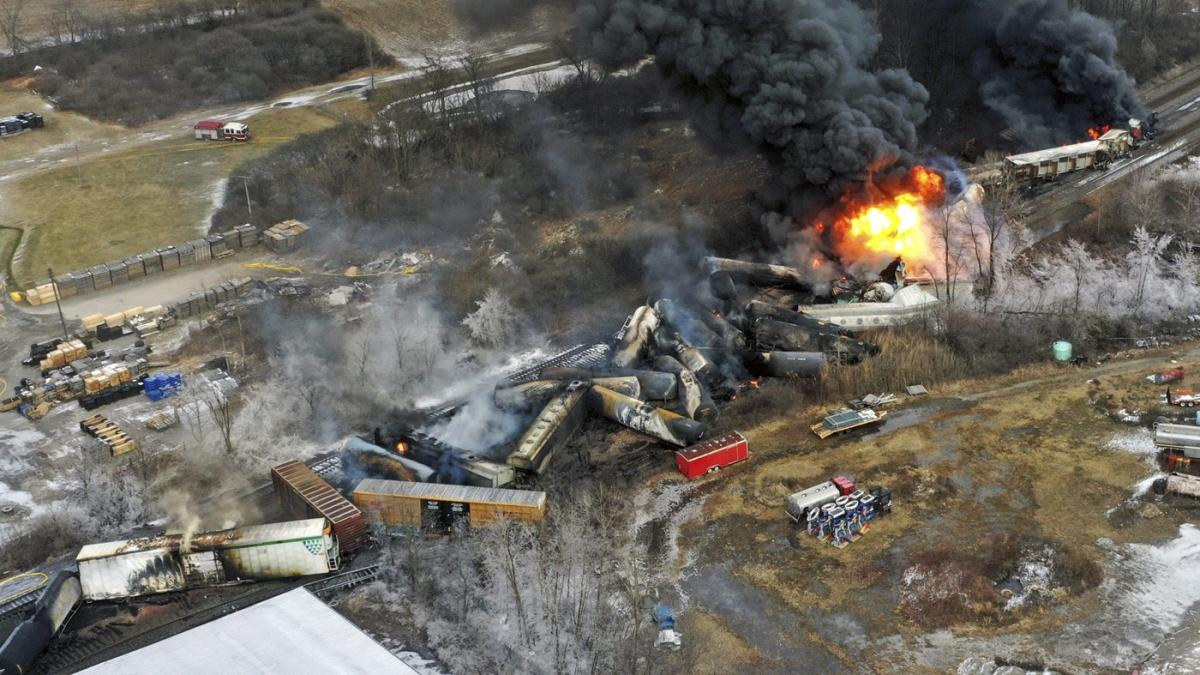Few residents waive $600 million settlement over derailment in East Palestine, Ohio

Despite doubts raised by residents about the deal, few people ultimately rejected the $600 million settlement that Norfolk Southern offered to victims of last year’s catastrophic train crash in East Palestine, lawyers say.
Plaintiffs’ attorneys said only 22 of the nearly 2,000 households in the small Ohio town where the February 2023 derailment occurred had opted out of the deal before the July 1 deadline. In total, as of Monday’s filing deadline, only 173 of the more than 190,000 households in the 20-mile area around the derailment covered by the deal had decided not to accept it.
The train crash involved various dangerous chemicals leaking from tank cars that burst. Days after the derailment, officials decided to blow up five tank cars and burn the vinyl chloride inside because they were concerned the cars might explode. The National Transportation Safety Board has said the venting and burning procedure was probably unnecessary, but officials who made that decision did not have all the information they needed.
A federal judge has tentatively approved the deal, but a hearing is scheduled for late September to decide whether the deal will go ahead. Separately, as part of a settlement with the federal court, Norfolk Southern has agreed to pay a $15 million fine and make changes to its operations.
In a statement Tuesday, the lawyers said that “the public response to the settlement has been overwhelmingly positive” and thousands of lawsuits have already been filed.
A few local residents have formally objected to the deal, saying it is unfair that some of the people most affected by the derailment ended up receiving the least compensation, and that people were not given enough time or information to decide whether the deal was fair.
Residents had a chance to hear the reasons for the train derailment and the communication failures at the NTSB hearing on June 25. But the agency did not release its final report until Friday – nearly two weeks after people living near East Palestine had to decide whether to accept the settlement. And lawyers have not yet submitted the detailed test results and other evidence they collected as part of the lawsuit.
Some residents could get little or nothing from the settlement because the final amount they receive will be reduced by the assistance they have received since the Norfolk Southern derailment. Even households near the derailment that were supposed to receive about $70,000 could end up with nothing if the railroad puts them up in expensive hotels or rental homes for months.
One of the leading critics of the agreement, Jami Wallace, said that people like her who lost their homes and became ill after the derailment should not be denied compensation.
“To receive nothing for suffering and intentional poisoning is neither fair nor appropriate,” Wallace said in her formal objection.
Norfolk Southern provided more than $21 million in direct assistance to families who had to temporarily relocate following the derailment.
The lawyers who negotiated the deal with the railroad have said such a set-off procedure is common in any litigation, so residents would likely face it even if they sued Norfolk Southern on their own.
The amount of compensation victims will receive will also depend on how close they lived to the derailment and how it affected them. Court documents show that a family living less than two miles from the derailment could receive $70,000 in compensation for property damage. Someone living farther away will receive significantly less – perhaps as little as $250 for families living more than 15 miles away.
Attorneys have explained that some people may be able to receive more than the estimated amounts after a claims adjuster reviews all individual factors.
Local resident Tamara Lynn Freeze said in a handwritten note to the judge that it was unfair to force her to accept the settlement before she even knew exactly how much she could receive.
The settlement provides for $10,000 in compensation for injuries, but if residents accept that amount, they will no longer be able to sue the railroad company if they develop cancer or other serious illnesses. They do not have to accept the personal injury compensation to receive the money for property damage.
Many people still complain of breathing difficulties, unexplained rashes and other symptoms more than a year after the derailment, while others have no health problems. And residents are worried about the possible long-term health consequences of all the chemicals they were exposed to.
The court will not allow possible future health costs to be taken into account in the settlement because they are not yet known, the lawyers say.
If the judge approves the settlement, the plaintiffs’ lawyers are expected to pay up to $162 million in legal fees from the settlement.
Josh Funk, Associated Press

